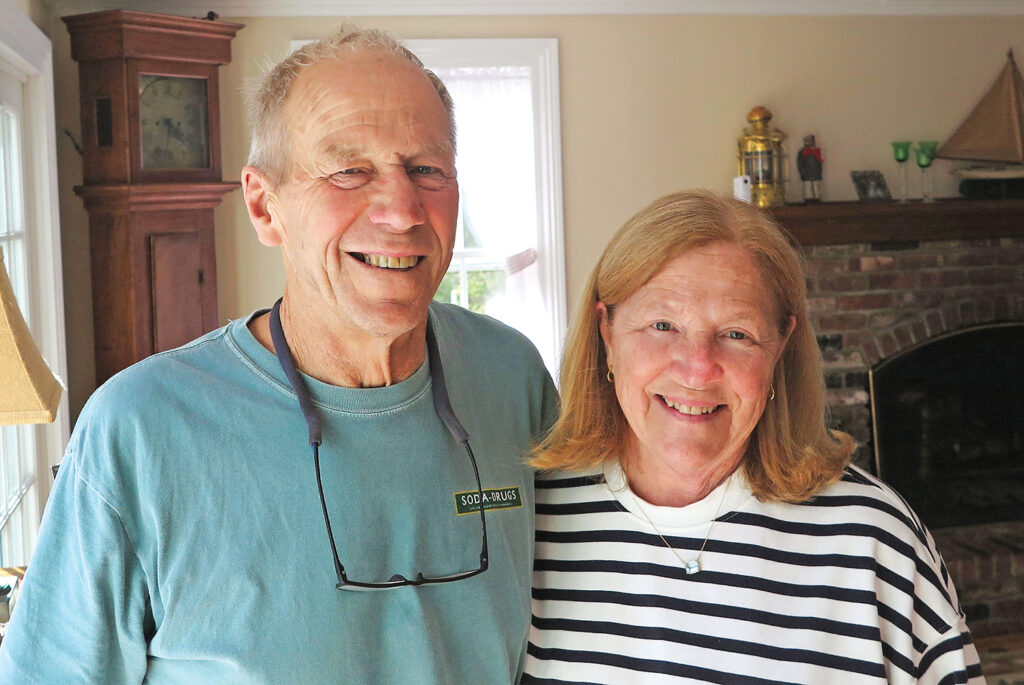Codger’s Shelter Island column: Past as prologue

History comes joyously alive with a dozen old-timers around a long table chortling through stacks of antique postcards and photographs. They are finding pictures of grandparents and houses they once lived in. Codger leans in toward a woman waving a group portrait of a 1930’s Shelter Island high school basketball team.
“A little before your time,” he says gallantly.
“But I know the names, they were my neighbors.” She winks and begins a long story.
This is grass roots history, family and neighborhood, where it all begins. It‘s important because it gives meaning to the way we now live, it offers clues to what may happen next, critical in this time of disruption and uncertainty.
The photo party was being hosted last week by the Shelter Island History Museum, the second episode in what looks like a hit series with the Senior Citizens Foundation. This time, the event was being recorded by the Museum’s Living History Project crew — Martin Levenstein, Tim Purtell and Steve Kazmierski — who have been plumbing the past in remarkable interviews with dozens of older residents.
There turns out to be some interesting if ironic history in this, too. In an attempt to enhance its status, the Historical Society recently became a museum, just in time to take disadvantage of the Trump administration’s attempt to redact or at least revise the historical record of anything that might not fit its agenda.
This included, by executive order, removing from such beloved museums as the Smithsonian Institution “improper ideology,” which turned out to focus on both the discrimination and contribution of women, minorities and gay people. Make history disappear! If purged from the archives, does that mean the past never happened, the future? Is King George III still in charge?
“Improper ideology” sounds like something out of the old Soviet Union or China’s cultural revolution. Had Cold War Communism come back and won? Or did this just reflect America’s current tariff deals with Russia and China?
The shock and awe of the Trump regime’s firestorm of new laws, violations of old laws, and outright outlawry, has led many Shelter Islanders to wonder what can be done to counteract what feels like a bum’s rush toward dictatorship.
Actually, it turns out there is something to be done, rather easily in fact. Vote “Yes” for Proposition 4 on Tuesday, May 20, between Noon and 9 p.m. at the school gym. It’s a vote for history and democracy.
It’s also more important and less expensive than it looks at first. Shelter Islanders are being asked to approve $275,000 in the new school budget for its museum. If your home is assessed at a million dollars, this will cost you $43.30 a year. It seems cheap at the price to save your links to the past, the stories of how this island grew, the signs to where it could be headed. It’s also a vote to preserve the lessons of the past.
Understandably, some residents chafe at yet another expense in the rising cost of living, along with school taxes, grocery prices and impending ferry fares amid a looming recession (and whose fault is that?). Codger thinks this is worth it.
As explained by History Museum Executive Director Nanette Lawrenson, the $275,000 represents 63% of the museum’s annual $432,000 budget. With Trump’s federal defunding of museums and libraries, it’s up to Shelter Island to provide a stable income for operating costs as well as more programs and continued free admission. Last week’s photo session with Island elders was a good example of a core goal, community outreach combining historical education, some fun and cookies.
The organization has provided free meeting space for other town groups as well as one of the Island’s most popular ongoing events, the Saturday Havens Farmers Market, which also does not charge admission, or for that matter, turn a profit.
Codger likes to think that voting for the History Museum is a small but welcome act of resistance, like showing up in Greenport a few weeks ago in a surprisingly robust crowd, one of about 1,400 gatherings nationwide protesting a political plague that has abducted people without due process, interfered with medical research and treatment and defied the rules of law. It’s comforting to learn from history that small acts of defiance lead to insurgency and change.
Even with the cookies coming, Codger slipped out of the photo party early to walk Cur III and talk about the future. A senior snagged him at the door. “Want to hear a smart trivia question? Sure you do. What is the 250th anniversary we’ll be celebrating this weekend? I’ll tell you. The start of the American Revolution!”
Talk about shock and awe. Codger thanked her profusely. You get the best ideas from history. Revolution. It worked before.









